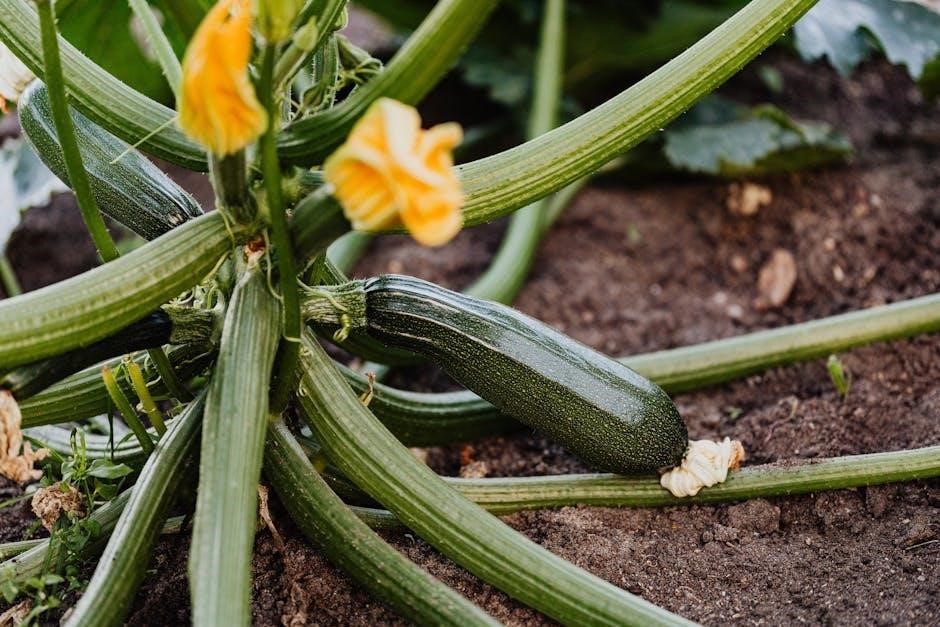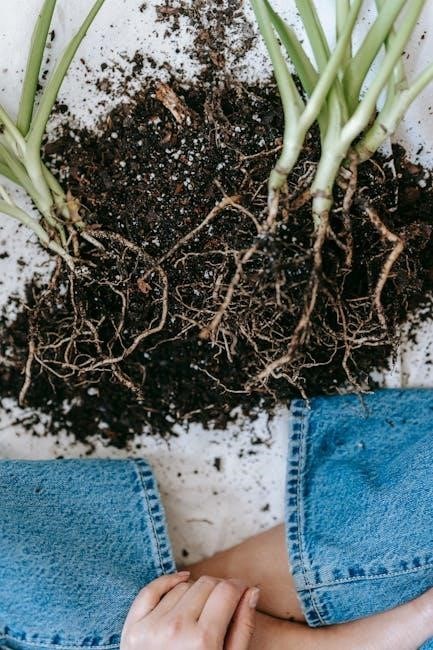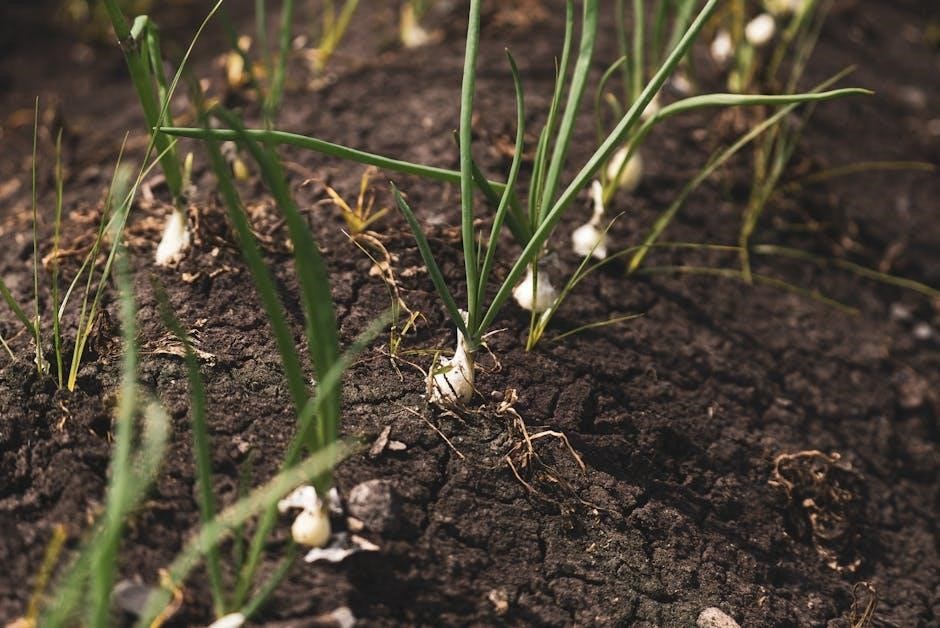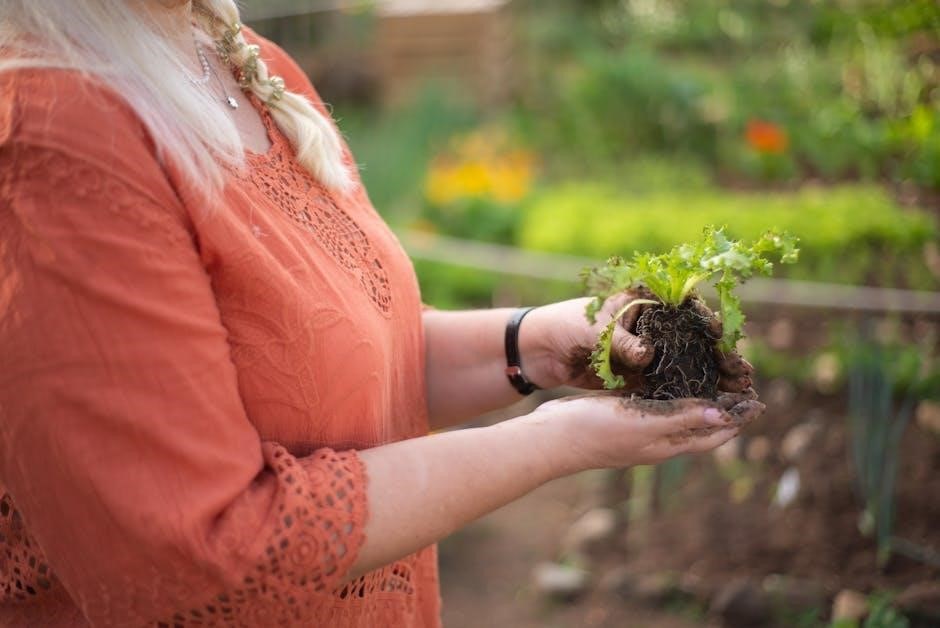Perth’s Mediterranean climate offers ideal conditions for year-round vegetable gardening. Located in Western Australia, the region’s warm, dry summers and mild, wet winters make it perfect for growing a variety of crops. Seasonal planting is key to maximizing yields, ensuring gardeners can enjoy fresh produce throughout the year. With proper planning and soil preparation, vegetable planting in Perth can be highly rewarding, providing both nutritional benefits and environmental advantages.
1.1 Understanding Perth’s Mediterranean Climate
Perth’s Mediterranean climate features hot, dry summers and mild, wet winters, creating distinct growing conditions. Understanding this climate is crucial for vegetable gardening, as it dictates planting times and crop selection. The dry summer months require careful watering, while the cooler, wetter winters support a variety of cool-season crops. This climate pattern allows for year-round gardening with proper planning and adaptation.
1.2 Importance of Seasonal Planting
Seasonal planting is essential in Perth’s Mediterranean climate, as it ensures vegetables thrive in optimal conditions. Aligning planting schedules with seasonal temperature and rainfall patterns maximizes growth and reduces pest and disease risks. Planting warm-season crops like tomatoes in summer and cool-season crops like broccoli in winter guarantees a continuous harvest and healthier plants throughout the year;

Best Vegetables to Grow in Perth
Perth’s climate supports a wide variety of vegetables. Tomatoes, leafy greens, carrots, radishes, zucchini, beans, and herbs thrive in its conditions, making it ideal for diverse home gardens.
2.1 Popular Cool-Season Crops
Broccoli, spinach, carrots, and peas thrive in Perth’s cooler months. These crops prefer the mild autumn and winter seasons, making them ideal for planting from March to July. Lettuce and radishes also grow well in Perth’s climate, tolerating light frosts and dry spells. Planting these varieties ensures a bountiful harvest during the cooler part of the year.
2.2 Suitable Warm-Season Vegetables
Tomatoes, capsicum, zucchini, and cucumbers excel in Perth’s warm, dry summers. These vegetables thrive in well-drained soil and full sun, making them perfect for planting from spring to early summer. Eggplants and okra also grow well, tolerating high temperatures. Planting these varieties ensures a productive harvest during Perth’s warmer months, providing fresh, delicious produce for home use.
Soil Preparation for Vegetable Gardening
Soil preparation is crucial for successful vegetable gardening. Perth’s sandy soils benefit from adding compost and organic matter to improve structure and fertility, ensuring healthy plant growth.
3.1 Understanding Soil Types in Perth
Perth’s soil types vary, with sandy soils being most common due to its coastal location. These soils drain well but lack nutrients, requiring regular compost additions. Loamy soils, found in some areas, offer better fertility and water retention. Clay soils, less common, hold moisture longer, benefiting certain vegetables. Understanding your soil type is key to selecting suitable plants and improving soil health for optimal gardening results.
3.2 Tips for Improving Soil Fertility
Improving soil fertility in Perth involves adding organic matter like compost or well-rotted manure. Mulching helps retain moisture and suppress weeds. Regularly incorporating green manure crops or crop rotation enhances nutrient levels. Avoiding excessive chemical fertilizers and testing soil pH annually ensures optimal conditions. These practices promote healthy root growth and maximize vegetable yields in Perth’s unique soil conditions.

Seasonal Planting Guide
Perth’s Mediterranean climate allows year-round vegetable gardening. Plant cool-season crops in autumn and winter, and warm-season varieties in spring and summer. Plan according to seasonal patterns to maximize yields and enjoy a continuous harvest of fresh produce.
4.1 Spring Planting Recommendations
Spring in Perth is ideal for planting warm-season vegetables like tomatoes, peppers, zucchini, and beans; The mild temperatures and increasing daylight promote healthy growth. Plant carrots, radishes, and spinach for quick harvests. Ensure soil is well-prepared with compost or fertilizer. Rotate crops to maintain soil health and prevent pests. Tomatoes thrive when soil temperatures reach 15-20°C, typical in Perth’s spring. This season offers abundant opportunities for a bountiful and flavorful harvest.
4.2 Summer Planting Tips
Summer in Perth is ideal for growing heat-tolerant vegetables like eggplants, okra, and sweet potatoes. Plant in early summer to allow crops to mature before extreme heat sets in. Use drip irrigation and mulch to retain soil moisture. Regular watering and shade cloth can protect plants from intense sunlight. Choose drought-resistant varieties to optimize yields during Perth’s dry summer months.
4.3 Autumn and Winter Planting Options
Autumn and winter in Perth are perfect for planting cool-season crops. Vegetables like broccoli, cauliflower, carrots, and spinach thrive in the cooler months. Leafy greens such as kale and silverbeet also grow well. The mild winters allow for a wide range of crops. Ensure soil is well-prepared with compost and good drainage to maximize yields and enjoy fresh produce year-round.

Choosing the Right Varieties
Selecting disease-resistant and compact varieties ensures success in Perth’s climate. Look for productive, space-saving options tailored to local conditions for optimal growth and yield.
5.1 Selecting Disease-Resistant Varieties
Selecting disease-resistant vegetable varieties is crucial for a thriving garden in Perth. Look for cultivars bred to withstand common local diseases like powdery mildew or root rot. Research varieties suitable for Perth’s climate and soil conditions to ensure optimal growth. This proactive approach minimizes pest and disease risks, reducing the need for chemicals and promoting healthier plants. Always check seed packets or consult local gardening resources for guidance.
5.2 Compact and Productive Varieties for Small Spaces
For small gardens in Perth, choose compact, productive vegetable varieties. Leafy greens like lettuce and kale thrive in tight spaces, while cherry tomatoes and herbs such as basil and mint grow well in containers. Dwarf varieties of peas and carrots are ideal for limited room. These plants maximize space, ensuring a bountiful harvest even in urban settings with minimal garden area.
Companion Planting
Companion planting enhances growth by promoting biodiversity and deterring pests. Pair tomatoes with basil or marigolds to boost flavor and repel nematodes, ideal for Perth’s climate.
6.1 Benefits of Companion Planting
Companion planting improves soil health, deters pests, and enhances growth. It promotes biodiversity, attracting pollinators like bees and beneficial insects. Certain plants repel pests naturally, reducing the need for pesticides. This method also maximizes space and creates a balanced ecosystem, making it ideal for Perth gardens, where diverse growing conditions are common. It supports sustainable gardening practices effectively.
6.2 Best Companion Plants for Common Vegetables
Basil pairs perfectly with tomatoes, improving flavor and deterring pests. Mint and lemongrass repel harmful insects, protecting vegetables like carrots and beans. Marigolds attract beneficial insects and ward off nematodes, ideal for tomatoes and cucumbers. Nasturtiums deter aphids and whiteflies, benefiting leafy greens. These combinations enhance growth, reduce pests, and boost productivity in Perth gardens, leveraging the region’s climate effectively.
Watering and Irrigation
Efficient watering techniques are essential for Perth gardens. Drip irrigation delivers water directly to roots, reducing evaporation and runoff. Water deeply in early morning or evening for optimal absorption.
7.1 Efficient Watering Techniques
Water vegetables deeply but infrequently to encourage deep root growth. In Perth’s Mediterranean climate, water during early morning or evening to minimize evaporation. Avoid overhead watering to reduce runoff and prevent fungal diseases. Use drip irrigation for efficient water delivery directly to roots, ensuring optimal hydration while conserving water. Monitor soil moisture to avoid overwatering.
7.2 Drip Irrigation for Vegetable Gardens
Drip irrigation is a highly efficient watering method for Perth gardens, delivering water directly to plant roots. It minimizes evaporation and runoff, conserving water. Ideal for Perth’s dry climate, drip systems can be tailored to garden size and soil type. Install emitters near plant bases and use timers for consistent watering, ensuring healthy growth while saving water.

Pest and Disease Management
Understanding common pests and diseases in Perth’s climate is crucial for a thriving vegetable garden. Regular monitoring and organic control methods help maintain plant health and productivity effectively.
8.1 Common Pests in Perth Gardens
Perth gardens often face pests like aphids, whiteflies, caterpillars, and snails. These pests can damage crops if left unchecked. Aphids and whiteflies thrive in warm climates, while caterpillars target leafy greens. Snails and slugs are most active at night, causing holes in foliage. Regular inspections, natural predators, and organic controls like neem oil or Bt can help manage these common garden pests effectively.
8.2 Organic Pest Control Methods
Organic pest control methods are essential for maintaining healthy gardens in Perth; Use neem oil to repel pests and disrupt their life cycles. Introduce natural predators like ladybugs or lacewings to control aphids and whiteflies. Companion planting with garlic, onions, or marigolds can deter pests. Physical barriers, like fine mesh, protect plants from insects and snails. Regular inspections and crop rotation also prevent infestations.
Using Raised Beds
Raised beds improve drainage and soil quality, ideal for Perth’s climate. They warm up faster in winter and cool down in summer, promoting healthy root growth.
9.1 Benefits of Raised Beds in Perth
Raised beds offer excellent drainage, reducing waterlogging risks in Perth’s wet winters. They warm up faster in cool seasons, extending the growing period. Better soil structure and aeration promote healthy root development, while elevated height reduces back strain. Raised beds also allow for better weed control and pest management, making them a practical choice for Perth gardeners.
9.2 Building and Maintaining Raised Beds
Construct raised beds using untreated wood or recycled materials, ensuring good drainage. Fill with a mix of compost and topsoil for optimal fertility. Maintain beds by topping up compost annually and adding mulch to retain moisture. Regularly weed and rotate crops to prevent soil depletion. Ensure beds are accessible for easy planting and harvesting, keeping pathways clear for maintenance;

Garden Layout and Spacing
Plan your garden layout for optimal productivity and accessibility. Use graph paper or apps to design beds, ensuring adequate spacing between plants for growth and air circulation.
10.1 Planning Your Garden Layout
Planning your garden layout is essential for maximizing space and productivity. Start by mapping your garden using graph paper or apps to visualize plant placement. Consider plant sizes, growth habits, and maturity times to avoid overcrowding. Group plants with similar water and sunlight needs together. Include pathways for easy access and ensure adequate spacing for airflow and maintenance. This step ensures a functional and productive garden layout.
10.2 Optimal Spacing for Vegetables
Optimal spacing for vegetables is crucial to prevent overcrowding, which can reduce growth and increase disease risk. Proper spacing ensures adequate airflow and sunlight penetration. For root vegetables like carrots and radishes, space them 5-10 cm apart. Leafy greens like lettuce and spinach require 20-30 cm, while larger plants like tomatoes and zucchini need 60-90 cm apart. Companion planting can also help maximize space efficiently.

Mulching and Weed Control
Mulching retains moisture, suppresses weeds, and regulates soil temperature. Use organic mulch like straw or bark chips around plants. Regular weeding ensures vegetables receive adequate nutrients and light.
11.1 Benefits of Mulching
Mulching is essential for retaining soil moisture, suppressing weeds, and regulating temperature. It reduces soil erosion and improves soil health over time. Organic mulch like straw or bark chips adds nutrients as it decomposes, creating a fertile ground for vegetables. This practice also minimizes the need for frequent watering and maintains a clean garden appearance, promoting healthy plant growth.
11.2 Effective Weed Control Strategies
Regular weeding is crucial to prevent competition for nutrients. Use tools like hoe or hand-weeders to remove weeds before they spread. Mulching helps suppress weed growth by blocking light. Maintain a tidy garden to reduce cover for unwanted plants. Regularly inspect and remove weeds to ensure your vegetables thrive in a healthy, weed-free environment.
Vegetable planting in Perth, WA, is a rewarding endeavor with its Mediterranean climate. By following seasonal guides and proper techniques, gardeners can enjoy fresh produce year-round and connect with nature while fostering sustainability and healthy living in their own backyard.
12.1 Summary of Key Points
Vegetable planting in Perth, WA, thrives in its Mediterranean climate, requiring seasonal planning and soil preparation. Choosing the right varieties, companion planting, and efficient watering are crucial. Mulching, weed control, and pest management ensure healthy growth. Raised beds and optimal spacing maximize yields. By following these guidelines, gardeners can enjoy a bountiful harvest and sustainable gardening success in Perth’s unique conditions.
12.2 Encouragement to Start Planting
Embrace the joy of growing your own vegetables in Perth! With its favorable climate and abundant resources, starting a garden is easier than you think. Whether you have a large yard or a small space, planting vegetables offers fresh produce, a sense of accomplishment, and a deeper connection to nature. Begin today and enjoy the rewards of sustainable gardening in Perth.
